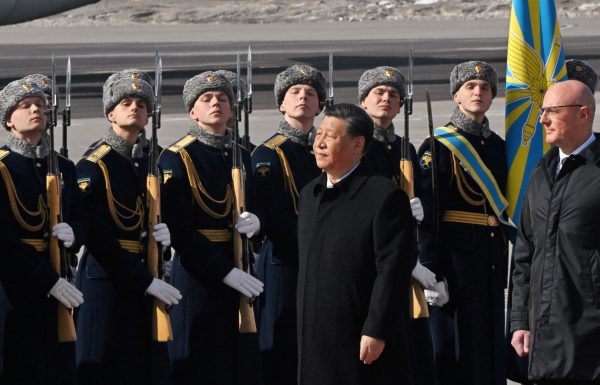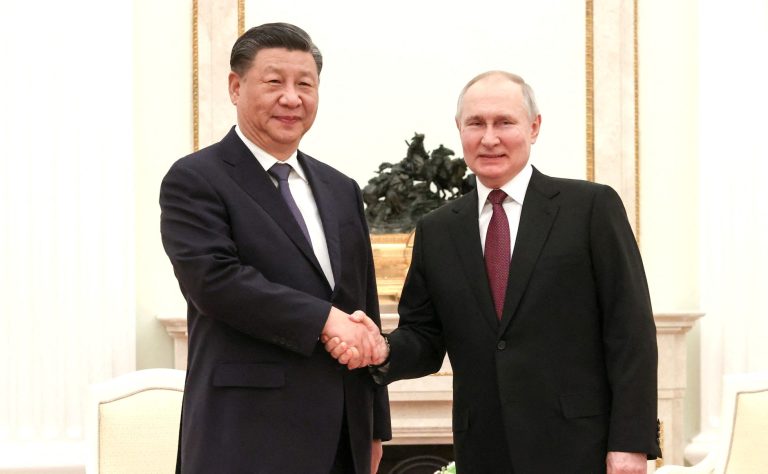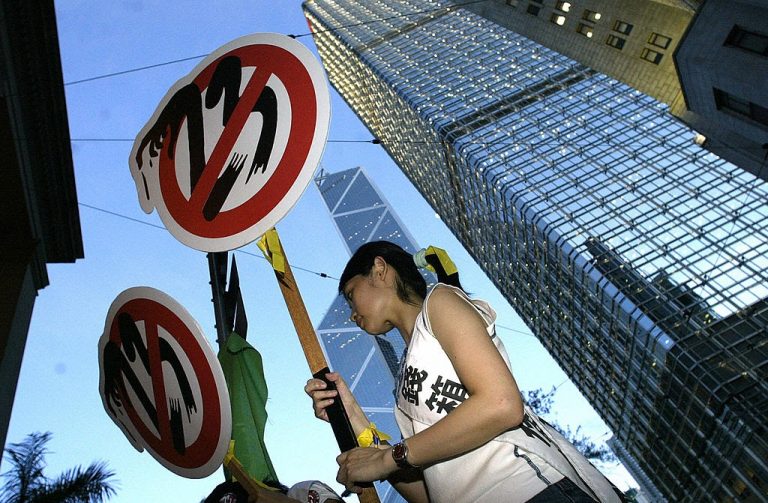Chinese leader Xi Jinping said he expected to further cement his regime’s “strategic partnership” with Russia and his “dear friend” Vladimir Putin on the first day of his three-day state visit to Moscow from March 20 to March 22.
The meeting attracted much attention as Beijing’s stance regarding the ongoing war in Ukraine is the subject of scrutiny from Western governments.
In a written statement he made upon his arrival, Xi announced to discuss possibilities of how to further cooperate on internal affairs and strategic collaboration on the international stage calling their partnership “a fine example for developing a new model of major-country relations featuring mutual respect, peaceful coexistence, and win-win cooperation.”
China will work with Russia to “uphold genuine multilateralism, promote a multipolar world and greater democracy in international relations, and help make global governance more just and equitable,” he added.
‘Dear friends’
The two men called each other “dear friends” when they met in the Kremlin on Monday afternoon during informal talks before dinner. On Tuesday and Wednesday, further in-depth formal talks took place.

Success
You are now signed up for our newsletter
Success
Check your email to complete sign up
Putin announced Russia would be assisting in building nuclear power plants in China, while the two powers will be broadening their teamwork on space exploration and new technologies.
According to the Chinese state broadcaster CCTV, the talks were seen as further elaborations of the “comprehensive strategic partnership of coordination for a new era” the two sides agreed upon in June 2019.
Last year, the trade volume between the two countries witnessed a robust growth of 29.3 percent to hit a record high of US$190.2 billion.
But while the two leaders both underpinned the strategic partnership resolutions, Putin failed to secure a commitment from China to buy larger quantities of Russian gas. This is a critical point for the Kremlin, which has seen its energy-reliant exports suffer owing to a raft of Western sanctions over the year-old Russian invasion of Ukraine.
Western sanctions made Russian energy cheaper, saving China billions of dollars, but there are still many other cheap natural gas providers, such as the U.S., Qatar, Australia, and Turkmenistan, that China can choose from.
Communist peace plan
During a call with reporters, Kremlin spokesman Dmitry Peskov said the two leaders would indeed discuss several items of Beijing’s peace plan, a comprehensive 12-point approach to the Ukraine crisis.
“One way or another, the topics figured in this plan will inevitably be touched upon during the exchange of views on Ukraine” between Putin and Xi, Peskov said.
The plan has been criticized by Western observers as validating Russia’s conquests in Ukraine, which include the Crimean peninsula and land in four provinces of southern and eastern Ukraine that Russia now claims are part of its sovereign territory.
READ MORE:
- Erdogan Confirms Extension of Russia-Ukraine Black Sea Grain Deal
- Russia’s Ally Belarus Cozies Up to China
- NATO Sets Its Gaze on Xi Jinping
- Many Western Brands Still Available in Russia Despite Sanctions
According to a Reuters translation from Russian, Xi stated in Rossiiskaya Gazeta, a daily published by the Russian government, “Complex problems do not have simple solutions.
“Many of the provisions of the peace plan proposed by China are in line with Russian approaches and could be used as the basis for a resolution when Kyiv and the West are ready for it,” Putin said Tuesday, Bloomberg reported, calling it “his most detailed comments yet on the blueprint.”
Western dismissal
The peace plan is met with a lot of misgiving in the West, especially by the United States, which on several occasions has expressed its concerns over China’s possible plans to provide weaponry to Russia to replenish Russia’s dwindling arms supplies.
At the same time, the West accuses Beijing of providing a lifeline to Russia’s besieged economy while reinforcing its closer energy partnership by boosting imports of Russian coal, gas, and oil.
It seems Xi, while siding with Putin in pushing back against too much U.S. influence in Eastern Europe, doesn’t want to get too tightly involved with Russia, especially when even more stringent Western sanctions will harm the Russian economy and, thus, China’s own up struggling economy lamed by its three years of self-imposed “zero-COVID” containment strategy.
The plan does not contain a specific itinerary for how to end the war. Ukraine reluctantly welcomed it, but the U.S. hasn’t officially studied it because China has refused to condemn Russia’s invasion.
According to Ukraine and its Western allies, any ceasefire would only buy Putin more time to prepare for a planned Ukrainian counteroffensive. Russia and China would have to agree to Russia’s withdrawal to uphold international law as they claim.
“This meeting wasn’t about a specific gas deal” or even China’s stance on the war in Ukraine, Alexander Korolev, senior lecturer at the University of New South Wales in Sydney who wrote China-Russia Strategic Alignment in International Politics, said, according to the outlet. “It’s about consolidating China-Russia alignment in the context of deteriorating US-China relations.”
Reuters contributed to this report.

















